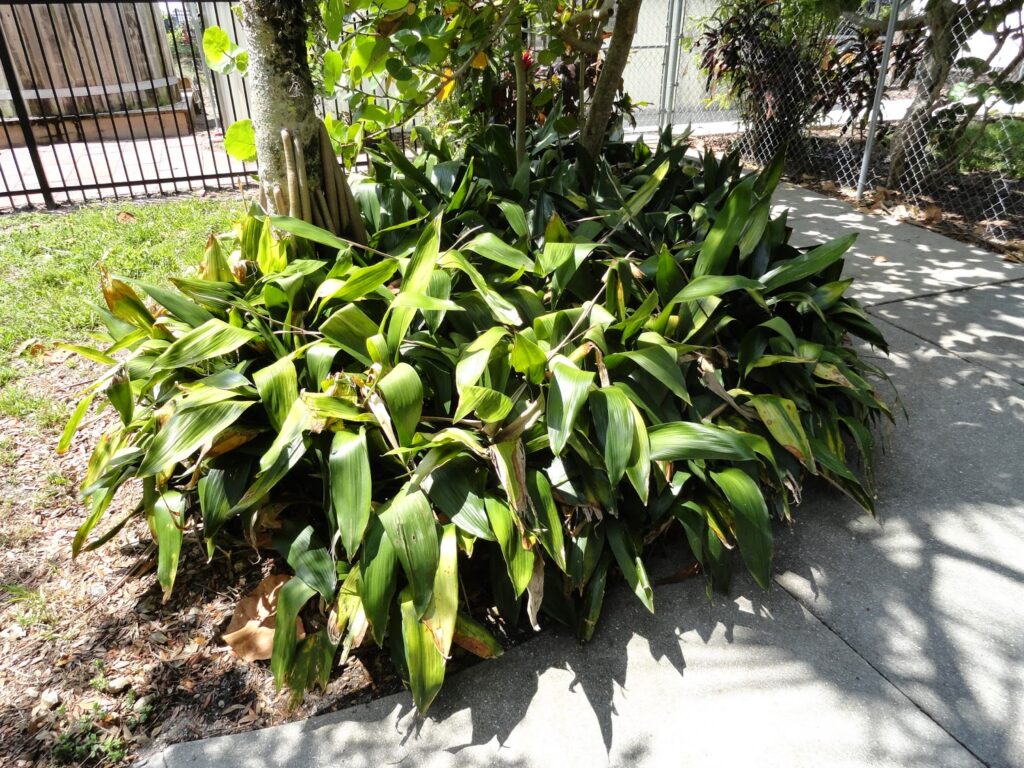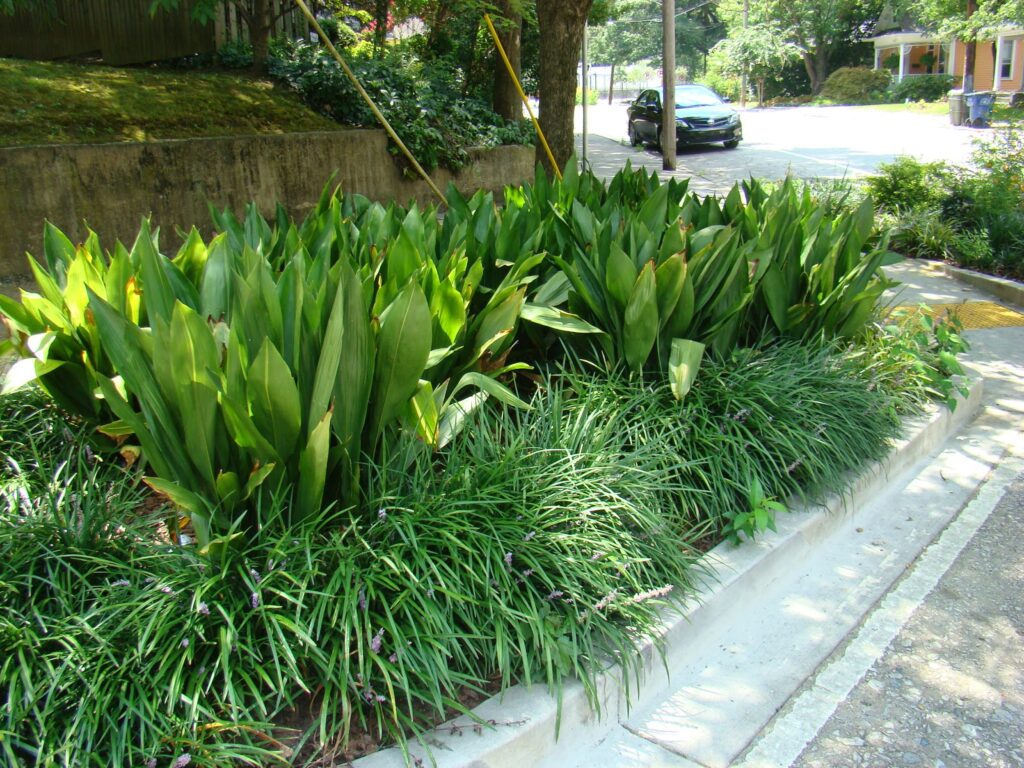Cast iron plants, also known as Aspidistra elatior, are indeed deer resistant.
This tough and durable plant can thrive in various conditions, making it a favorite for gardeners looking to keep their landscapes free from deer damage.
When it comes to finding plants that deer won’t munch on, the cast iron plant stands out. With its hardy nature and ability to withstand neglect, it’s an excellent choice for gardens plagued by deer.
You’ll also appreciate the low maintenance of cast iron plants. They rarely need special care, adding ease and beauty to your garden without the worry of deer eating them.

Cast Iron Plants
Cast Iron Plants (Aspidistra elatior) are popular for their lush, dark green foliage. These perennial plants thrive in shade and are perfect for adding elegance to your landscape or as a houseplant. They are evergreen and can grow well in various conditions.
These plants prefer moist, well-drained soil. Ideal soil types include loamy or sandy soils. They do best in partial shade but can tolerate a shady spot. The leaves grow in a clumping fashion and can reach up to 2 feet in length.
Key Points:
- Type: Perennial
- Foliage: Evergreen, lush, and dark green
- Best Conditions: Partial to full shade
- Soil: Moist, well-drained, rich, sandy, or loamy
- Water Needs: Moderate, avoid over-watering
- Temperature: 50°F to 85°F
- Maintenance: Low-maintenance
These plants are very low-maintenance. They do not require frequent watering, so over-watering can be harmful. In a landscape setting, maintain good air circulation around the plants and ensure proper drainage.
Consider adding compost to enhance soil richness. When planting, make sure the hole is about as deep as the rootball and twice as wide. This will help the roots grow freely.
Whether you are placing them outdoors or indoor as a houseplant, Cast Iron Plants can withstand a range of conditions and still maintain their beauty. Keep in mind the temperature and humidity levels to ensure a healthy plant.
Are Cast Iron Plants Deer Resistant?
Cast iron plants (Aspidistra elatior) are often considered deer-resistant.
Deer typically avoid them due to their tough, leathery leaves with a coarse texture.
This makes cast iron plants a good choice if deer frequently visit your garden.
Although cast iron plants are not deer-proof, they are not usually the first choice for foraging deer.
Compared to other plants, they suffer less damage even in high deer-populated areas.
Choosing plants that are less attractive to deer can help protect your garden.
Adding some of these plants alongside your cast iron plants may also enhance your garden’s beauty and resilience.
How To Keep Deer From Eating Cast Iron Plants

Deer can cause significant damage to your cast iron plants. They nibble on leaves, leaving the plants looking ragged and unhealthy.
You can use several methods to protect your cast iron plants from deer.
Barriers are effective. Install a fence around your garden. A height of at least 8 feet can keep deer out. You can use metal or plastic stakes for support. This physical barrier is one of the best ways to protect your plants.
Repellents also work well. Try making a DIY spray with household items. The smell will make your cast iron plants unappetizing to deer.
Another option is using motion-activated lights. Deer are creatures of habit and startle easily. The sudden light can scare them away from your garden.
Planting deterrents around your cast iron plants is another strategy. Choose plants with fuzzy or bristly textures. Deer dislike these and avoid areas where such plants grow. Examples include lamb’s ear and Russian sage.
Lastly, use essential oils. Mix 1 part water, 1 part vinegar, and 10 drops of peppermint or eucalyptus oil. Spray this mixture on your cast iron plants. The strong scent acts as a deterrent.
Will Cast Iron Plants Grow Back After Being Eaten By Deer?
Cast Iron Plants (Aspidistra elatior) are known for their resilience. If deer nibble on the leaves, the plant will usually survive. These plants have a natural ability to regrow their foliage over time.
Recovery Tips:
- Protect the Roots: Deer generally don’t eat plant roots. So, as long as the roots are intact, the plant can regenerate.
- Trim Damaged Leaves: Cut back any severely damaged leaves. This encourages new growth.
You can help your Cast Iron Plant recover faster with a little care. Fertilization during the growing season from late spring to early summer can promote healthy regrowth. Use a balanced liquid fertilizer for indoor plants and granular fertilizer for outdoor plants.
Here’s a simple table to help you with the process:
| Action | Benefit |
|---|---|
| Trim damaged leaves | Encourages new leaf growth |
| Fertilize | Promotes overall plant health |
| Keep soil healthy | Supports regrowth and vitality |
Understanding Deer’s Diet
Deer are herbivores that consume a variety of plants. Their diet changes with the seasons and the available food sources.
Seasonal Variations In Deer’s Diet
In spring and summer, deer primarily eat green, leafy plants. They also consume tender shoots, grasses, and herbs.
This provides them the nutrients needed for growth and energy.
As fall approaches, deer switch to eating more nuts and fruits.
Acorns, apples, and berries become important, offering higher energy for the approaching winter.
During winter, food becomes scarce.
Deer often browse on woody plants, such as twigs and bark, to survive.
They may also eat evergreens like cedar and pine when other food sources are limited.
Other Wildlife And Cast Iron Plants
Cast iron plants are known for their strong, resilient nature. They often thrive even in tough conditions. But how do they fare when it comes to other wildlife in your garden?
Insects: Most common insects, like aphids or spider mites, tend to leave cast iron plants alone. The tough, broad leaves don’t provide an attractive home or food source for them.
Small Mammals: Small wildlife like squirrels or rabbits generally ignore cast iron plants. These animals prefer softer, more palatable plants. The sturdy nature of cast iron plants makes them less appealing.
Birds: Birds also show little interest in cast iron plants. They might land or perch on the leaves but they don’t tend to cause any harm. The plants don’t offer much in terms of food or nesting material.
Toxicity: Cast iron plants are non-toxic to most animals. This includes pets like dogs and cats, making them safe options for households with curious animals.
Deer: Cast iron plants are often labeled as deer-resistant. Unlike many other plants, deer rarely munch on these hardy leaves. This resistance makes them an excellent choice for gardens plagued by deer.
